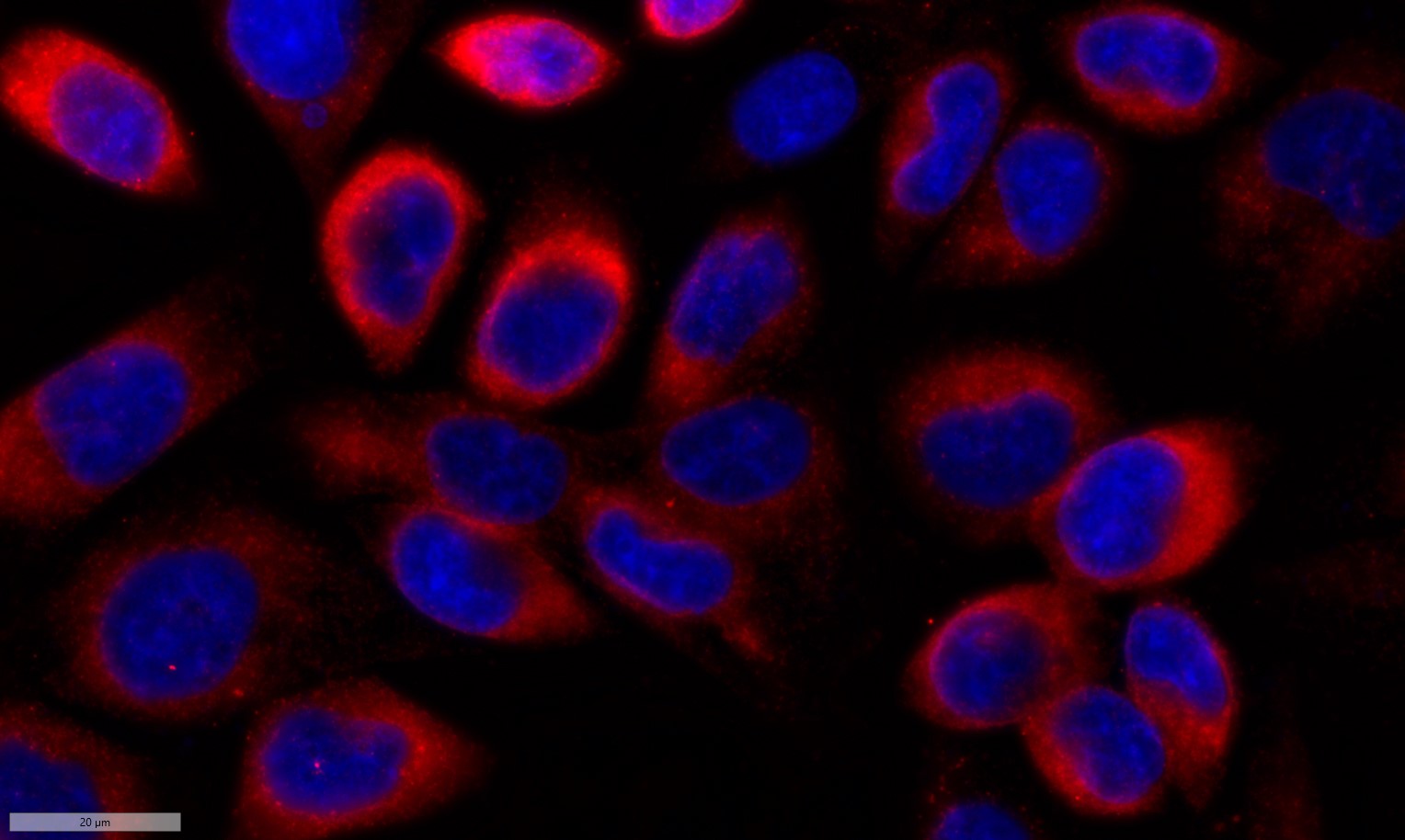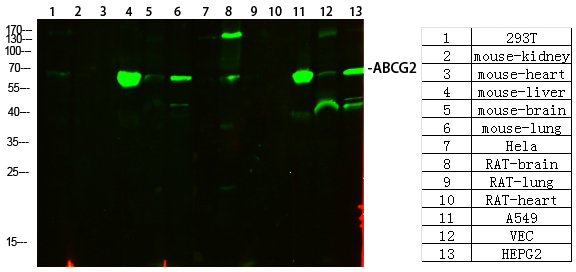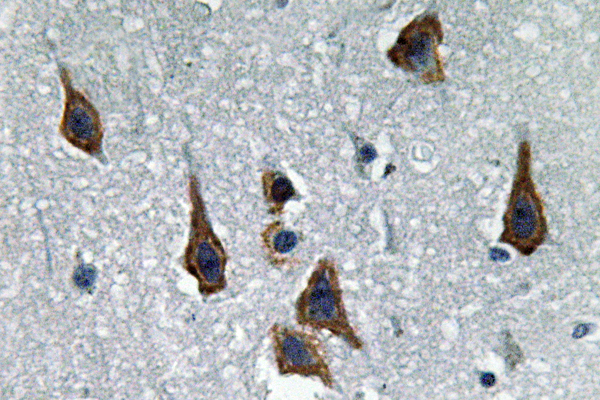ABCG2 Polyclonal Antibody
- Catalog No.:YT0053
- Applications:WB;IHC;IF;ELISA
- Reactivity:Human;Rat;Mouse;
- Target:
- ABCG2
- Fields:
- >>Antifolate resistance;>>ABC transporters;>>Bile secretion
- Gene Name:
- ABCG2
- Protein Name:
- ATP-binding cassette sub-family G member 2
- Human Gene Id:
- 9429
- Human Swiss Prot No:
- Q9UNQ0
- Mouse Swiss Prot No:
- Q7TMS5
- Immunogen:
- The antiserum was produced against synthesized peptide derived from human ABCG2. AA range:289-338
- Specificity:
- ABCG2 Polyclonal Antibody detects endogenous levels of ABCG2 protein.
- Formulation:
- Liquid in PBS containing 50% glycerol, 0.5% BSA and 0.02% sodium azide.
- Source:
- Polyclonal, Rabbit,IgG
- Dilution:
- WB 1:500 - 1:2000. IHC: 1:100-300 ELISA: 1:20000. IF 1:100-300 Not yet tested in other applications.
- Purification:
- The antibody was affinity-purified from rabbit antiserum by affinity-chromatography using epitope-specific immunogen.
- Concentration:
- 1 mg/ml
- Storage Stability:
- -15°C to -25°C/1 year(Do not lower than -25°C)
- Other Name:
- ABCG2;ABCP;BCRP;BCRP1;MXR;ATP-binding cassette sub-family G member 2;Breast cancer resistance protein;CDw338;Mitoxantrone resistance-associated protein;Placenta-specific ATP-binding cassette transporter;CD antigen CD338
- Observed Band(KD):
- 72kD
- Background:
- The membrane-associated protein encoded by this gene is included in the superfamily of ATP-binding cassette (ABC) transporters. ABC proteins transport various molecules across extra- and intra-cellular membranes. ABC genes are divided into seven distinct subfamilies (ABC1, MDR/TAP, MRP, ALD, OABP, GCN20, White). This protein is a member of the White subfamily. Alternatively referred to as a breast cancer resistance protein, this protein functions as a xenobiotic transporter which may play a major role in multi-drug resistance. It likely serves as a cellular defense mechanism in response to mitoxantrone and anthracycline exposure. Significant expression of this protein has been observed in the placenta, which may suggest a potential role for this molecule in placenta tissue. Multiple transcript variants encoding different isoforms have been found for this gene.
- Function:
- function:Xenobiotic transporter that may play an important role in the exclusion of xenobiotics from the brain. May be involved in brain-to-blood efflux. Appears to play a major role in the multidrug resistance phenotype of several cancer cell lines. When overexpressed, the transfected cells become resistant to mitoxantrone, daunorubicin and doxorubicin, display diminished intracellular accumulation of daunorubicin, and manifest an ATP-dependent increase in the efflux of rhodamine 123.,induction:Up-regulated in brain tumors.,PTM:Glycosylation-deficient ABCG2 is normally expressed and functional.,similarity:Belongs to the ABC transporter family. ABCG (White) subfamily.,similarity:Contains 1 ABC transmembrane type-2 domain.,similarity:Contains 1 ABC transporter domain.,subunit:Monomer or homodimer; disulfide-linked.,tissue specificity:Highly expressed in placenta. Low expression in small i
- Subcellular Location:
- Cell membrane ; Multi-pass membrane protein . Apical cell membrane ; Multi-pass membrane protein . Mitochondrion membrane ; Multi-pass membrane protein . Enriched in membrane lipid rafts. .
- Expression:
- Highly expressed in placenta (PubMed:9850061). Low expression in small intestine, liver and colon (PubMed:9861027). Expressed in brain (at protein level) (PubMed:12958161).
Kaempferol Can Reverse the 5-Fu Resistance of Colorectal Cancer Cells by Inhibiting PKM2-Mediated Glycolysis Int J Mol Sci. 2022 Jan;23(7):3544. WB Human 1:2000
Enhanced autophagy reveals vulnerability of P-gp mediated epirubicin resistance in triple negative breast cancer cells. APOPTOSIS Apoptosis. 2016 Apr;21(4):473-488 WB Human MDA-MB-231 cell
Anti-hyperuricemic potential of stevia (Stevia rebaudiana Bertoni) residue extract in hyperuricemic mice. Food & Function Food Funct. 2020 Jul;11(7):6387-6406 IHC,IF Mouse Renal tissue
- June 19-2018
- WESTERN IMMUNOBLOTTING PROTOCOL
- June 19-2018
- IMMUNOHISTOCHEMISTRY-PARAFFIN PROTOCOL
- June 19-2018
- IMMUNOFLUORESCENCE PROTOCOL
- September 08-2020
- FLOW-CYTOMEYRT-PROTOCOL
- May 20-2022
- Cell-Based ELISA│解您多样本WB检测之困扰
- July 13-2018
- CELL-BASED-ELISA-PROTOCOL-FOR-ACETYL-PROTEIN
- July 13-2018
- CELL-BASED-ELISA-PROTOCOL-FOR-PHOSPHO-PROTEIN
- July 13-2018
- Antibody-FAQs
- Products Images

- Immunofluorescence analysis of Siha cell. 1,primary Antibody was diluted at 1:100(4°C overnight). 2, Goat Anti Rabbit IgG (H&L) - AFluor 594 Secondary antibody(catalog No: RS3611) was diluted at 1:500(room temperature, 50min).

- Western Blot analysis of various cells using primary antibody diluted at 1:1000(4°C overnight). Secondary antibody:Goat Anti-rabbit IgG IRDye 800( diluted at 1:5000, 25°C, 1 hour)

- Immunohistochemistry analysis of paraffin-embedded human brain, using ABCG2 Antibody. The picture on the right is blocked with the ABCG2 peptide.



